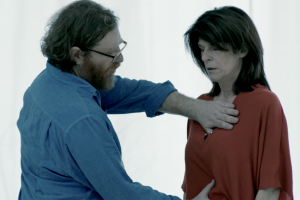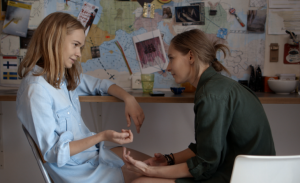Romanian Film Debuts in 2018
The number of Romanian film debuts has increased significantly over the last 2-3 years, mostly as a result of the competitions organized by the Romanian Film Center, which have a separate funding section for fiction debuts at each session, but also due to the advance of digital technology which has facilitated film productions, and more and more filmmakers have taken courage in making them (including producing their films independently, with very little money). And it reached over ten in 2018 (only fiction films, the documentary area has its own debutants), an unexpected figure. A record figure for the last 20 years, at least.
New directors emerged, of different ages (mostly young), many of them very promising (some are actors who wanted to get behind the camera). And the trend will continue. This primarily results in a most welcome thematic and stylistic diversification. On the one hand, there are young directors who want to get away from the New Wave aesthetics and try a more mainstream, more commercial cinema, inspired by the American cinema. On the other hand, there are other young directors, mostly women (a new premiere), who bring in a more radical, highly personal, often intimate cinema, where the boundary between fiction and documentary is blown up and which brings new themes and supporting characters in the foreground. At the same time, there are young directors who follow one or another filmmaker representative of the New Wave, which emerged during mid-2000s.
The most relevant film debuts in 2018 reflected each of the three directions.
Surely, the most important debut of the year was Touch Me Not, directed by Adina Pintilie, who won not only the Golden Bear at Berlinale but also the award for the best debut film.
Touch Me Not will be released on February 1st, 2019 in Romanian cinemas, but it had already screened in many international and local film festivals after premiering at this year’s edition of Berlinale. Adina Pintilie proposes a risky movie, an experiment film (not experimental!), combining fiction, documentary and a kind of therapeutic self-exploration workshop. It’s a hard-to-designate film, awkward at times, with a clinical aspect, about different ways of exploring privacy and sexuality, and about our deepest fears. Few films have this explosive potential to divide the audience (familiar or not with this type of films) so much – from violent rejection to praise. Regardless of the reactions, it is a film that will remain a landmark in Romanian cinema.

Another extremely brave debut, where fiction combines with cine-verite, was Soldiers. Story from Ferentari, directed by Ivana Mladenovic. An adaptation of the successful fictional autobiographical novel Soldiers. Story from Ferentari, written by Adrian Schiop, who is also cast in the main role, the film follows the relationship, including the sexual aspect of it, between a PhD student in sociology (with a thesis on gypsy music) and a Roma (the excellent Vasile Pavel-Digudai) in a bad neighbourhood in Bucharest which appears in the film title. A non-spectacular and non-theatrical film, but a polemical one; Ivana Mladenovic (coming from Serbia to study film in Romania, she has settled here for many years) enters with curiosity, patience and empathy an unfamiliar area for the Romanian cinema – (and usually treated sensationalist in the media).

A same-sex love relationship is also addressed by Bogdan Theodor Olteanu in his independent film, made with limited funding, Several Conversations About a Very Tall Girl, who has two very promising young actresses playing the main characters, Silvana Mihai and Florentina Nastase. An atypical film for the Romanian cinema, not very daring and quite weak, but with a lightness that deserves some acclamation.

Inspired by Cristian Mungiu’s aesthetics (who was also the producer and helped on the script), Lemonade, directed by Ioana Uricaru, is a powerful drama, though quite conventional, about how the American dream can turn into a nightmare following the story of a Romanian nurse who arrives in the US in an attempt to make a better future for her family. The script is sometimes simplified and predictable, and directing shows an easy mannerism that reduces emotional impact, but Lemonade has plenty of good moments, especially when it escapes the constraints of writing and is allowed to breathe. And Mălina Manovici’s performance (a theater actress from Timişoara discovered by Cristian Mungiu for Graduation) is impressive.
Charleston, the debut feature of former film critic Andrei Crețulescu, was also a surprise. A dark comedy, but in very vivid colors. A film of an assumed artificiality which reflects the cinematic (but also musical) tastes of its author. It’s an eye-catching film due to its pretty good jokes (even if their effect is expected). But the affliction the film unfolds in leaves no room for the emotion pursued, at least in the end, by this mourning story that wavers between frivolity and seriousness.

An honorable debut, though not original (because it owes too much to Radu Muntean’s filmmaking), was A Decent Man, directed by Hadrian Marcu. Inspired by Petru Cimpoeșu’s novel, Natural, the film follows the dilemma of a man (Bogdan Dumitrache) caught between a relationship with his future wife and the concern for an ailing mistress. Hadrian Marcu shows a solid directing and is faithful to the principles of the New Wave realistic cinema: moral dilemmas, long takes, ellipsis, lack of soundtrack. And when it does not follow the characters from behind (walking or driving), the camera keeps its distance.
Mihaela Popescu’s Yet to Rule is an ambitious attempt to enter fantasy and impressionism. Although, it’s a risky film, always in danger of losing its fragile balance.
And Alone at My Wedding, (a Belgium-Romania co-production), directed by Marta Bergman, is based on the extraordinary energy of actress Alina Șerban, who carries a film with a rather conventional dramaturgical structure – the story of a young Roma going to Belgium after a man she met through a matrimonial agency, leaving her daughter in Romania.
Other fiction debuts released in cinemas in 2018 were The Wanderers, directed by Dragoş Buliga, The Secret of Happiness, by Vlad Zamfirescu, Coborâm la prima, by Tedy Necula, and Pup-o, mă!, by Camelia Popa – four simple films without too much to show.
Photographer and editor; she co-founded Dissolved Magazine together with Melissa. For Films in Frame she gathers film and TV series recommendations for lazy weekends and she writes about interesting projects from the film industry. Other than that, she likes traveling, chilling with her cats and sleeping.
